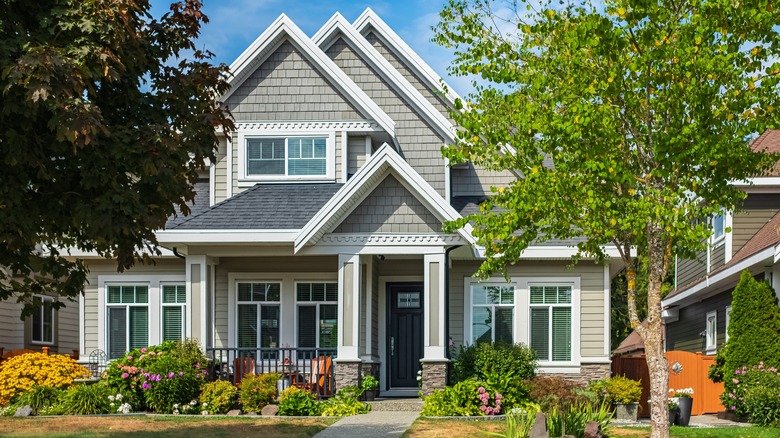The Paint Trick That Can Help Keep Your Home Cooler On Hot Summer Days
If you live in an area that experiences high heat in the summer months, you'll likely want to pull out all the stops to keep your home cool. Fortunately, there are some simple tips for keeping your home protected in scorching temperatures such as improving insulation, adding window treatments, and installing an exterior awning. Many of these hacks can help improve energy efficiency in your home, simultaneously keeping it cool while also reducing utility costs.
One of the most effective ways to keep your home cool is to paint its exterior a lighter color. White and other light, neutral colors reflect heat well and help keep you cool when inside during hot summer days. According to the Department of Energy (DOE), black and other dark, dull colors can absorb as much as 70 to 90 percent of the sun's radiant energy and heat. If your home has a dark exterior paint, don't be surprised if it's much harder to keep cool once the warmer season rolls around.
While a dark exterior can be useful for retaining heat in the winter months, especially if you live in a colder climate, you should consider repainting if you live in a warmer region. This will help keep your home cool and save you a lot of money on utilities.
Choosing the right paint color
If you want to keep your home cool, white is a great color to consider painting its exterior. It will reflect the sun's rays and allow the interior of your abode to retain cold air more easily. Other lighter colors and neutrals — such as beige, cream, and gray — can have a similar effect.
Remember, however, that the ability to reflect heat probably isn't the only thing you'll want to consider when deciding on a paint color. You should also consider your home's architecture and design as well as your personal preferences to ensure that you're happy with the end result. Before painting your home, be sure to get some test samples and carefully consider your decision. It's also important to know the longevity of your paint. Consider a gloss mixture if you're looking for the most durable option. Finally, consider whether there are any homeowners association (HOA) or city requirements and guidelines that you need to follow. Knowing what these are before painting your home will help you avoid major headaches later on.

